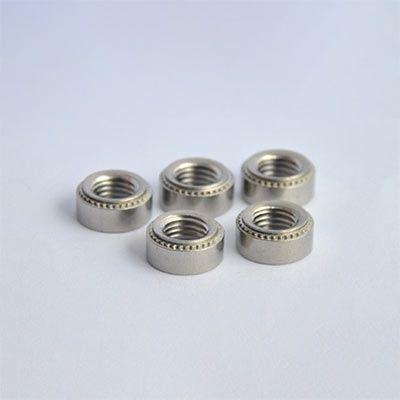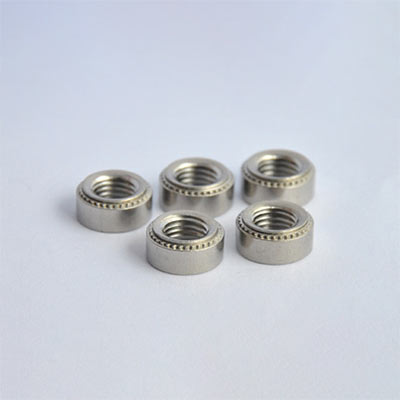
self clinching fasteners are high-performance, durable fastening solutions designed to create secure, permanent connections in thin sheet materials, such as metals and plastics, without the need for additional hardware, welding, or tapping. These fasteners are ideal for applications in industries such as automotive, aerospace, electronics, and manufacturing, where reliable, space-efficient, and strong connections are critical.

Secure, Permanent Connections
Self Clinching Fasteners are pressed into a hole in a thin sheet material, where they deform the material and create a strong, permanent connection. This eliminates the need for additional threads or nuts, providing a stable, vibration-resistant hold.
Versatile Materials
These fasteners are available in a range of materials, including stainless steel, aluminum, and brass, and are suitable for use with a variety of substrates like steel, aluminum, and plastic, offering broad compatibility for different applications.
No Thread Cutting or Tapping
Self clinching fasteners provide a threaded insert into thin materials without the need to cut threads or tap the material. This simplifies the manufacturing process and improves cost-efficiency.
Corrosion Resistance
Many self clinching fasteners are made from corrosion-resistant materials or are coated for enhanced durability, making them suitable for use in harsh environments, including those subject to moisture, chemicals, or extreme temperatures.
Load-Bearing Capacity
Designed to withstand high loads and stresses, self clinching fasteners provide excellent resistance to shear and pull-out forces, ensuring a secure and durable connection over the product’s lifespan.
Automotive: Used in automotive assemblies for secure and durable connections in lightweight materials and thin metal sheets.
Electronics: Commonly used in electronics for securing components to circuit boards or for assembly in tight spaces.
Aerospace: Ideal for lightweight aerospace applications requiring strong, vibration-resistant fastening solutions.
Industrial Manufacturing: Used in sheet metal fabrication, machinery, and equipment to simplify the assembly process.
Self Clinching Nuts: Provide a threaded insert into thin sheet metal, ideal for assembling parts with screws or bolts.
Self Clinching Studs: Allow for easy attachment of components to a base material by providing a stud that can be screwed into.
Self Clinching Standoffs: Offer a raised, stable connection for mounting or securing other components.
Self Clinching Bushings: Provide an insert for creating smooth, strong bearings in thin materials.
Increased Productivity: Easy installation with minimal tooling, reducing labor costs and assembly time.
Compact Design: Perfect for space-constrained designs without compromising the strength and integrity of the connection.
Cost-Effective: Eliminates the need for additional fasteners, reducing the overall cost of materials and labor.
Enhanced Durability: With their corrosion-resistant properties, these fasteners ensure long-lasting, reliable connections, reducing maintenance and replacement costs.
FAQ
Self Clinching Fasteners are specialized fasteners designed to provide a strong, permanent connection in thin sheet materials such as metal or plastic. They are installed by pressing them into a pre-punched hole, where they deform the material and create a secure, reliable hold without the need for additional hardware or threads.
Self Clinching Fasteners work by being inserted into a pre-punched hole in the material. The fastener has a flange that deforms the material as it is pressed in, creating a mechanical bond that holds the fastener securely in place. This bond resists vibration and shearing forces, ensuring long-lasting reliability.
Self Clinching Fasteners can be used with a variety of materials, including thin sheet metals like aluminum, steel, stainless steel, and brass. They are also compatible with certain plastics, making them versatile for different applications.
The main advantages of using Self Clinching Fasteners include:
No need for tapping or threads: The fastener creates its own thread in the material.
High load-bearing capacity: They can withstand high forces without loosening.
Vibration resistance: Ideal for applications subject to vibrations.
Corrosion resistance: Many fasteners are made from or coated with corrosion-resistant materials.
Cost-effective: They reduce the need for additional hardware or specialized tooling.
There are several types of Self Clinching Fasteners:
Self Clinching Nuts: Provide a threaded insert for secure attachment of screws.
Self Clinching Studs: Provide a stud for mounting components.
Self Clinching Standoffs: Raised fasteners used for spacing components.
Self Clinching Bushings: Provide a smooth, durable surface for bearings or other components.